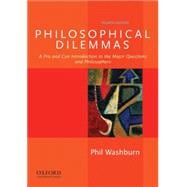Philosophical Dilemmas: A Pro and Con Introduction to the Major Questions and Philosophers, Fourth Edition, outlines the classic arguments made by philosophers through the ages. It features sixty-three brief topical essays by author Phil Washburn organized around thirty-one fundamental philosophical questions like "Does God exist?" "Is morality relative?" and "Are we free?" Each essay takes a definite stand and promotes it vigorously, creating a sharp contrast between the two positions and giving each abstract theory a more personal and believable "voice." The accessible writing style and conflicting answers encourage students to examine the different positions and to think carefully about which essay makes the stronger case.
This fourth edition, a major revision, now enriches the discussion of each philosophical question by adding fifty-four brief essays--two in each chapter--on great philosophers who held conflicting viewpoints on the issues covered. Additionally, the chapters have been rearranged so that these essays and the philosophers discussed appear in approximate chronological order, from Plato and Protagoras to Wittgenstein and Searle. The text is enhanced by numerous pedagogical features including an introduction to each issue, key terms, chapter summaries, study questions after each essay, chronologies, a glossary, and an appendix on how to write an essay.
A Companion Website at www.oup.com/us/washburn contains online sources and self-test questions for students and numerous instructor resources: introductions to the issues; summaries of the topical essays; summary points, PowerPoint-based slides, and test questions for the historical essays; answers to the critical questions that follow each essay; test questions on the topical essays; suggestions for class discussions; and a list of online resources.








